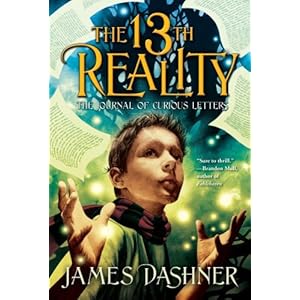Re

The first installment of Dashner's series follows the adventures of Atticus (Tick) Higginbottom as he attempts to decipher a series of clues from a mysterious author known only as "M.G." As Tick takes the plunge and decides to follow the clues to an unknown but allegedly courageous fate, disaster and danger follow him. With his father helping him on, The Journal of Curious Letters culminates in a daring mission and the feeling that many adventures will come!
First off, The Journal of Curious Letters is written in a witty style that I love. Dashner uses language well, although some of it is a little overdone--he too frequently uses phrases like "as if he'd just revealed a mystery recipe stolen from the Keebler elves." Still, he writes smoothly and the narrative flows well, for the most part.
Tick is an easily loved character. A sensible kid, self-ascribed nerd--and happy with it. He's got a great home life, which is always nice to read about in a good fantasy. Tick takes the bullying at his school with patience, but learns through the book that he doesn't have to take it and it doesn't mean fighting back. I throughly enjoyed watching Tick grow stronger and more confident. To my relief, Tick is a 13 year old, who acts and behaves like a 13 year old.
Dashner includes a whole cast of characters who are fascinating and very intriguing. Mothball (an abnormally tall, skinny woman from the 4th reality) and Rutger (an abnormally short, fat little man from the 11th reality) are very entertaining.
I adore the tidbit about Master George's command center being in the Bermuda Triangle! Maybe you can get there by sailing through the Rick Riordan's Sea of Monsters, and it's probably within visiting distance of Brandon Mull's "Shoreless Isle" from Fablehaven! (I am seriously considering remapping my heroine Finna's home to the Bermuda Triangle--seems like all the good fantasies allude to it! :)
Some criticisms:
Dashner uses far to many points of view for my taste. Though meant to give more 'camera angles' to the story, it often jolts and disrupts the narrative.
As mentioned above, the similes--though sometimes hilarious--are used too often, as is Mothball's Yoda-like speaking style.
Tick sometimes remains in the dark too long about concepts that the readers have already easily worked out. Mothball and Rutger often inadvertently reveal half-sentences about the meaning of the clues and the realities, which the reader understands quickly, but somehow leave Tick as simply confused. Since Tick is supposedly bordering on genius, this plot hiccup sometimes makes him a little less believable. In addition, although Tick's teacher unknowingly points Tick in the exactly right direction with discussions on Quantum Physics in his middle school class that should have cleared up Mothball and Rutger's half-spoken hints about the Realities, it still takes him the entire book to work out, and in the end Master George still has to explain to Tick most of what the readers have already worked out.
Overall, Dashner's The Journal of Curious Letters is an entertaining book--probably best for kids around 9-15, but still enjoyable for everyone.

